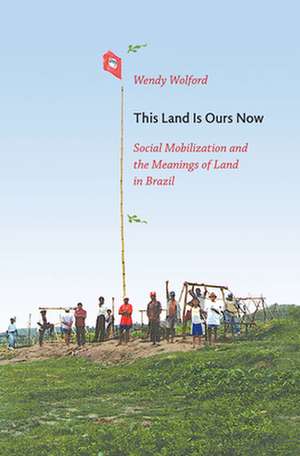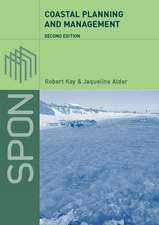This Land Is Ours Now – Social Mobilization and the Meanings of Land in Brazil
Autor Wendy Wolforden Limba Engleză Paperback – 26 ian 2010
Preț: 263.29 lei
Nou
Puncte Express: 395
Preț estimativ în valută:
50.38€ • 52.98$ • 41.63£
50.38€ • 52.98$ • 41.63£
Carte tipărită la comandă
Livrare economică 16-30 aprilie
Preluare comenzi: 021 569.72.76
Specificații
ISBN-13: 9780822345398
ISBN-10: 0822345390
Pagini: 296
Ilustrații: 14 photographs, 13 tables, 1 map
Dimensiuni: 155 x 233 x 21 mm
Greutate: 0.43 kg
Editura: MD – Duke University Press
ISBN-10: 0822345390
Pagini: 296
Ilustrații: 14 photographs, 13 tables, 1 map
Dimensiuni: 155 x 233 x 21 mm
Greutate: 0.43 kg
Editura: MD – Duke University Press
Recenzii
Precious few ethnographic subjects have ever been accorded the respect, critical eye, and deep attention Wendy Wolford pays on every page to ordinary Brazilians. Her study of the MST is exemplary in every way. The voices and texture are palpable and are woven into an analytically powerful and conceptually original argument. A signal contribution to the study of land reform of social movements, and of Brazilian politics. Im frankly a little jealous of what she has achieved here.--James C. Scott, Sterling Professor Political Science and Anthropology, Yale University
This Land Is Ours Now is destined to become a classic in social movement literature and among those who study property relations, land tenure, and development policy. Offering a fresh, honest, and insightful take on a compelling but previously oversimplified story, it has broad implications for the political strategies of social movements, autonomous communities, and development alternatives in Latin America and throughout the world.--Dianne Rocheleau, Professor of Geography and Global Environmental Studies, Clark University
This book deserves to become a staple of syllabi in courses on social movements, peasants, Brazil and Latin America studies. It is undoubtedly a major contribution. - Benjamin Goldfrank, BLAR, Vol 32, No 1, January 2013
"Precious few ethnographic subjects have ever been accorded the respect, critical eye, and deep attention Wendy Wolford pays on every page to ordinary Brazilians. Her study of the MST is exemplary in every way. The voices and texture are palpable and are woven into an analytically powerful and conceptually original argument. A signal contribution to the study of land reform of social movements, and of Brazilian politics. I'm frankly a little jealous of what she has achieved here."--James C. Scott, Sterling Professor Political Science and Anthropology, Yale University "This Land Is Ours Now is destined to become a classic in social movement literature and among those who study property relations, land tenure, and development policy. Offering a fresh, honest, and insightful take on a compelling but previously oversimplified story, it has broad implications for the political strategies of social movements, autonomous communities, and development alternatives in Latin America and throughout the world."--Dianne Rocheleau, Professor of Geography and Global Environmental Studies, Clark University "This book deserves to become a staple of syllabi in courses on social movements, peasants, Brazil and Latin America studies. It is undoubtedly a major contribution." - Benjamin Goldfrank, BLAR, Vol 32, No 1, January 2013
This Land Is Ours Now is destined to become a classic in social movement literature and among those who study property relations, land tenure, and development policy. Offering a fresh, honest, and insightful take on a compelling but previously oversimplified story, it has broad implications for the political strategies of social movements, autonomous communities, and development alternatives in Latin America and throughout the world.--Dianne Rocheleau, Professor of Geography and Global Environmental Studies, Clark University
This book deserves to become a staple of syllabi in courses on social movements, peasants, Brazil and Latin America studies. It is undoubtedly a major contribution. - Benjamin Goldfrank, BLAR, Vol 32, No 1, January 2013
"Precious few ethnographic subjects have ever been accorded the respect, critical eye, and deep attention Wendy Wolford pays on every page to ordinary Brazilians. Her study of the MST is exemplary in every way. The voices and texture are palpable and are woven into an analytically powerful and conceptually original argument. A signal contribution to the study of land reform of social movements, and of Brazilian politics. I'm frankly a little jealous of what she has achieved here."--James C. Scott, Sterling Professor Political Science and Anthropology, Yale University "This Land Is Ours Now is destined to become a classic in social movement literature and among those who study property relations, land tenure, and development policy. Offering a fresh, honest, and insightful take on a compelling but previously oversimplified story, it has broad implications for the political strategies of social movements, autonomous communities, and development alternatives in Latin America and throughout the world."--Dianne Rocheleau, Professor of Geography and Global Environmental Studies, Clark University "This book deserves to become a staple of syllabi in courses on social movements, peasants, Brazil and Latin America studies. It is undoubtedly a major contribution." - Benjamin Goldfrank, BLAR, Vol 32, No 1, January 2013
Notă biografică
Wendy Wolford is Associate Professor of Sociology at Cornell University.
Textul de pe ultima copertă
""This Land Is Ours Now" is destined to become a classic in social movement literature and among those who study property relations, land tenure, and development policy. Offering a fresh, honest, and insightful take on a compelling but previously oversimplified story, it has broad implications for the political strategies of social movements, autonomous communities, and development alternatives in Latin America and throughout the world."--Dianne Rocheleau, Professor of Geography and Global Environmental Studies, Clark University
Cuprins
List of Illustrations
List of Tables
Acknowledgments
1. Mobilization within Movements
2. The Making of a Movement in Southern Brazil
3. The MST's Imagined Community and Agrarian Populism
4. The Making of a Movement in Northeastern Brazil
5. Moral Economies of Sugarcane and Social Mobilization
6. Going Bananas: Producing for Market, State, and Movement
Conclusion
Notes
Bibliography
Index
List of Tables
Acknowledgments
1. Mobilization within Movements
2. The Making of a Movement in Southern Brazil
3. The MST's Imagined Community and Agrarian Populism
4. The Making of a Movement in Northeastern Brazil
5. Moral Economies of Sugarcane and Social Mobilization
6. Going Bananas: Producing for Market, State, and Movement
Conclusion
Notes
Bibliography
Index
Descriere
Looks at Brazil's largest grassroots social movement, Movement of Rural Landless Workers, or MST, to show how mobilization is shaped by cultural understandings of material and spatial environments.








